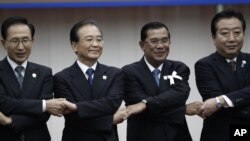PHNOM PENH —
Asian leaders say they will launch negotiations into what could become a massive free trade area. On Tuesday, the 10-member Association of Southeast Asian Nations agreed to launch discussions on a possible free-trade zone that could link its economies with those of China, India, South Korea, Japan, Australia and New Zealand.
ASEAN leaders officially launched negotiations for the Regional Comprehensive Economic Partnership, or RCEP, during the last day of the leaders' summit in Cambodia Tuesday. By seeking to link major economies including China and India, with those of Southeast Asia, the move could be a step toward creating a significant, new trading bloc.
Although human rights issues and maritime disputes have been topics of discussion during these meetings, regional leaders have sought to put the spotlight on trade.
China has recently taken a renewed interest in pushing forward with talks for the initiative. Observers say this could be a reaction to the ongoing U.S. strategic "pivot" toward Asia.
Since the United States does not have a free trade agreement with ASEAN, it is not eligible to join talks on RCEP. Instead, Washington is pursuing a separate free trade area called the Trans-Pacific Partnership, or TPP. That formation does not include China.
"I think it's very important," said Ernie Bower, who is with the Washington-based Center for Strategic and International Studies. "It's extremely important right now because it's our only current trade engagement with Asia in terms of a new agreement. So we have FTAs with Australia, Singapore & Korea and a TPP will get us in the game in terms of regional trade opening agreements. But it is itself not sufficient. We're going to have to do more."
The TPP may not be ASEAN-based, but U.S. President Barack Obama has spent time during this week's summit discussing the Trans-Pacific Partnership with potential members.
Australian Prime Minister Julia Gillard's country is involved in talks on both RCEP and the TPP. She says the strategy is not about choosing a U.S.-involved trade agreement over an ASEAN or China-focused pact.
"Getting economic integration which benefits Australia in our region is a pretty hard thing to do," said Gillard. "So any opportunity we've got to prosecute that agenda. So from our perspective, it makes sense to be involved in both and to be maximizing our efforts in both."
Reports say that talks on the Regional Comprehensive Economic Partnership could start as early as next year.
ASEAN leaders officially launched negotiations for the Regional Comprehensive Economic Partnership, or RCEP, during the last day of the leaders' summit in Cambodia Tuesday. By seeking to link major economies including China and India, with those of Southeast Asia, the move could be a step toward creating a significant, new trading bloc.
Although human rights issues and maritime disputes have been topics of discussion during these meetings, regional leaders have sought to put the spotlight on trade.
China has recently taken a renewed interest in pushing forward with talks for the initiative. Observers say this could be a reaction to the ongoing U.S. strategic "pivot" toward Asia.
Since the United States does not have a free trade agreement with ASEAN, it is not eligible to join talks on RCEP. Instead, Washington is pursuing a separate free trade area called the Trans-Pacific Partnership, or TPP. That formation does not include China.
"I think it's very important," said Ernie Bower, who is with the Washington-based Center for Strategic and International Studies. "It's extremely important right now because it's our only current trade engagement with Asia in terms of a new agreement. So we have FTAs with Australia, Singapore & Korea and a TPP will get us in the game in terms of regional trade opening agreements. But it is itself not sufficient. We're going to have to do more."
The TPP may not be ASEAN-based, but U.S. President Barack Obama has spent time during this week's summit discussing the Trans-Pacific Partnership with potential members.
Australian Prime Minister Julia Gillard's country is involved in talks on both RCEP and the TPP. She says the strategy is not about choosing a U.S.-involved trade agreement over an ASEAN or China-focused pact.
"Getting economic integration which benefits Australia in our region is a pretty hard thing to do," said Gillard. "So any opportunity we've got to prosecute that agenda. So from our perspective, it makes sense to be involved in both and to be maximizing our efforts in both."
Reports say that talks on the Regional Comprehensive Economic Partnership could start as early as next year.




